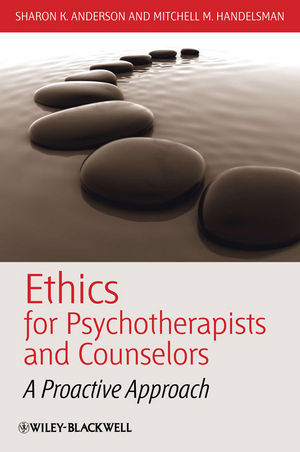|
Textbook
Ethics for Psychotherapists and Counselors: A Proactive ApproachISBN: 978-1-4051-7766-5
Paperback
272 pages
July 2009, ©2009, Wiley-Blackwell
 This is a Print-on-Demand title. It will be printed specifically to fill your order. Please allow an additional 10-15 days delivery time. The book is not returnable.
|
||||||
"So how can ethics educators overcome this defensive and rule-oriented culture? Sharon Anderson and Mitchell Handelsman offer an excellent solution for students in undergraduate or beginning master's level graduate programs...Perhaps the most striking thing about this book is the way that Anderson and Handelsman manage to make the process of ethical acculturation, even the very process of learning to understand and internalize mental health ethics, fun...The authors clearly understand the need to foster an active learning process that includes self-awareness, self-reflection, discovery, and application. Thus, this book goes far beyond the provision of didactic material-something all too rare in ethics texts. It is clear that Anderson and Handelsman are accomplished teachers in that their writing style is lighthearted, good-humored, engaging, and, most important, deeply empathic." (American Journal of Psychology, 1 March 2011)
"This is an excellent text, appropriate for graduate students, young psychologists, and even those of us who are "seasoned veterans" in the practice of psychology. I highly recommend the text and congratulate the authors for writing this excellent book." (Independent Practitioner, Fall 2010)
“It is useful in stressing those aspects of immersion into the ethics affective side of one’s professional development that is not always present in more didactic texts.” (PsycCRITIQUES, May 2010) "This book does not just teach professional ethics. It encourages students to aim high by supporting development of their professional and personal identities. That is the essence of sound ethical practice, and the authors have captured it."–Michael C. Gottlieb, Ph.D., ABPP, Independent Practice, Dallas, TX
"This excellent book for students or any professionals in
psychotherapy and counseling is part of a welcome trend in ethics
education that challenges students to strive for their highest
ethical ideals. Anderson and Handelsman do far more than repeat
rules and facts; they use the ethical acculturation model to
encourage students to reflect on their professional identity and
values. The book contains useful learning aides and exercises such
as the ethics autobiography, the ethics journal, realistic
vignettes, appendices, and useful charts. Anderson and Handelsman
succeed in presenting their well considered perspectives on
psychotherapy in a clear and personal style of writing. I highly
recommend this book!"
–Samuel Knapp, Ed.D., Director of Professional
Affairs, Pennsylvania Psychological Association
"I really like this book….it approaches ethics in a manner
that is hopeful, positive, but no-nonsense and thorough. I think it
is one of the best integrations of concepts around ethics and
ethical decision-making processes that I have seen, and one of the
most easily applied to a variety of levels of training. I also like
the application of an acculturation model as a way to understand
our initiation into the part of our profession that has to do with
ethics, ethical decision-making and ethical behavior."
–Susan L. Prieto-Welch, Counseling Center Director,
University of Notre Dame, Counseling Psychology
"Anderson and Handelsman have written a truly unique ethics
book; one that will be of value to every new as well as seasoned
psychotherapist in professions from social work to psychiatry. They
write about professional ethics as a process of acculturation that
requires the reader to consider themselves, their motivations, and
their feelings about the ethical requirements of the professions.
In order to facilitate the process of self-awareness, they provide
a series of activities like journaling to help the professional
continue to expand their awareness as they encounter topics like
confidentiality or multiple relationships. Whether or not an
instructor chooses this book as a primary text, it should be a
supplement to every course that is taught."
–Karen Strohm Kitchener, Professor Emeritus,
University of Denver
"This book is unique in my experience in that it encourages
readers to reflect on their own ethical predispositions as they
think about psychotherapy ethics. The book also helps students
understand differences between being an ethical person and an
ethical psychotherapist--a distinction that is difficult for most
students, and many professionals, to appreciate. The authors’
emphasis on helping readers know themselves as well as the
professional ethical guidelines is an important advance over other
ethics texts. The discussion of “positive ethics”
is also unique and helpful for professionals."
–William E. Sobesky, Ph.D., Clinical Associate
Professor of Psychiatry and Pediatrics, University of
Colorado Health Sciences Center
"This book is interesting and engaging. A variety of scenarios
and exercises make the process come alive for the reader and
encourage self-assessment and self-reflection. As an instructor I
think the text would generate many meaningful class discussions. It
is easy-to-read and easy to follow."
–Robin Lewis, Old Dominion University



